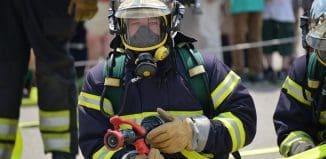New Tool for First Responders
This post is also available in:  עברית (Hebrew)
עברית (Hebrew)
Shortly after 9/11, reports began to emerge that one of the reasons many firefighters died in the attack was that police helicopters circling above the scene could not warn them the building was about to collapse. Ever since these reports, interoperability between different agencies has been a major concern for public safety leaders. What grew out of this concern was a massive initiative to create a cellular communication network just for first responders. And when all of the nation’s television stations were required to transition to digital broadcast signals about a decade ago that freed up radio spectrum in the 700MHz band and triggered a bidding war among cellular providers. It also spurred public safety officials to argue that 20MHz of this precious radio real estate should be reserved specifically for use by first responders.
That’s the birth of what would become the First Responder Network Authority. Today, the Authority is known as FirstNet. Established by Congress as part of the Middle Class Tax Relief and Job Creation Act of 2012, FirstNet was funded with $7 billion and given the mission of establishing, operating, and maintaining a nationwide interoperable broadband network for first responders.
According to policemag.com, the backers of this initiative quickly realized that the federal government was not going to fund a nationwide cellular system for first responders alone. The cost would have been staggering. So instead, FirstNet put out a bid for cellular companies to build the network. In March it was announced that AT&T had won that contract by offering to spend $40 billion over the next 25 years to create and maintain FirstNet.
FirstNet is to be a secure broadband cellular network that offers specific features for law enforcement. Mike Poth, FirstNet’s CEO, says broadband cellular communications devices are becoming more and more prevalent in law enforcement operations. For example, some of the nation’s largest agencies now issue smartphones to their officers. On existing networks officers have to compete with all the other cell traffic trying to access the network. Which can be a problem. Ely Reyes, assistant chief of the Austin Police Department, says his officers have extensive experience with cellular communication issues at special events like music festivals and football games. “When we have those large events, the cell network becomes congested, and it’s difficult to make calls or use data,” he says.
FirstNet is designed to let officers break through cellular traffic by giving them usage priority and even letting them pre-empt access to the network by other cellular users. As first envisioned after the release of the 9/11 Commission Report, public safety broadband was going to be a network where spectrum would be allocated for public safety use only. That proved impractical. So the concept of priority and pre-emption was developed. This means that FirstNet provider AT&T can use all of the spectrum it is acquiring through its agreement with FirstNet for commercial purposes until it is needed by public safety users. Chris Sambar, SVP for AT&T-FirstNet, says officers should think of their access to FirstNet as a special lane for communications that gives them special access and priority. “When first responders need it, they get immediate access, and it’s all theirs,” he said. Sambar added that in a major emergency, AT&T is willing to allocate all of its spectrum, for public safety priority use.
Public safety professionals with access to FirstNet will use special SIM cards in their phones. These cards will identify their calls as priority on the network and when necessary they will push other users off of the network to give the FirstNet user access. Sambar says in most cases other AT&T customers will not even notice they have been pre-empted. However, in a major incident scenario, some commercial customers may get bumped. The exception to this is 911 calls, which will also have priority on the network.
If a governor opts out of the AT&T plan, then the state or territory will have to build its own public safety broadband network that’s at least as robust. If a state opts in to the FirstNet/AT&T plan then there is no cost to the state for building, operating, or maintaining the network. Sambar says the AT&T plan is “low risk” for states and territories, and they are not obligated to use it, once the system is built. “If we build it and they don’t like it, they don’t have to buy the service,” he says.
AT&T has committed to bringing as many innovative tools as possible to FirstNet, Sambar says. For example, the company says it will work with its partners to produce broadband devices specifically for the network. Also, it is hiring a team of app developers to produce public safety software for the FirstNet app store, which will not be available to the public. “This is not Angry Birds. Every app will be vetted for cyber security vulnerabilities and tested to ensure it works,” Sambar says.






























